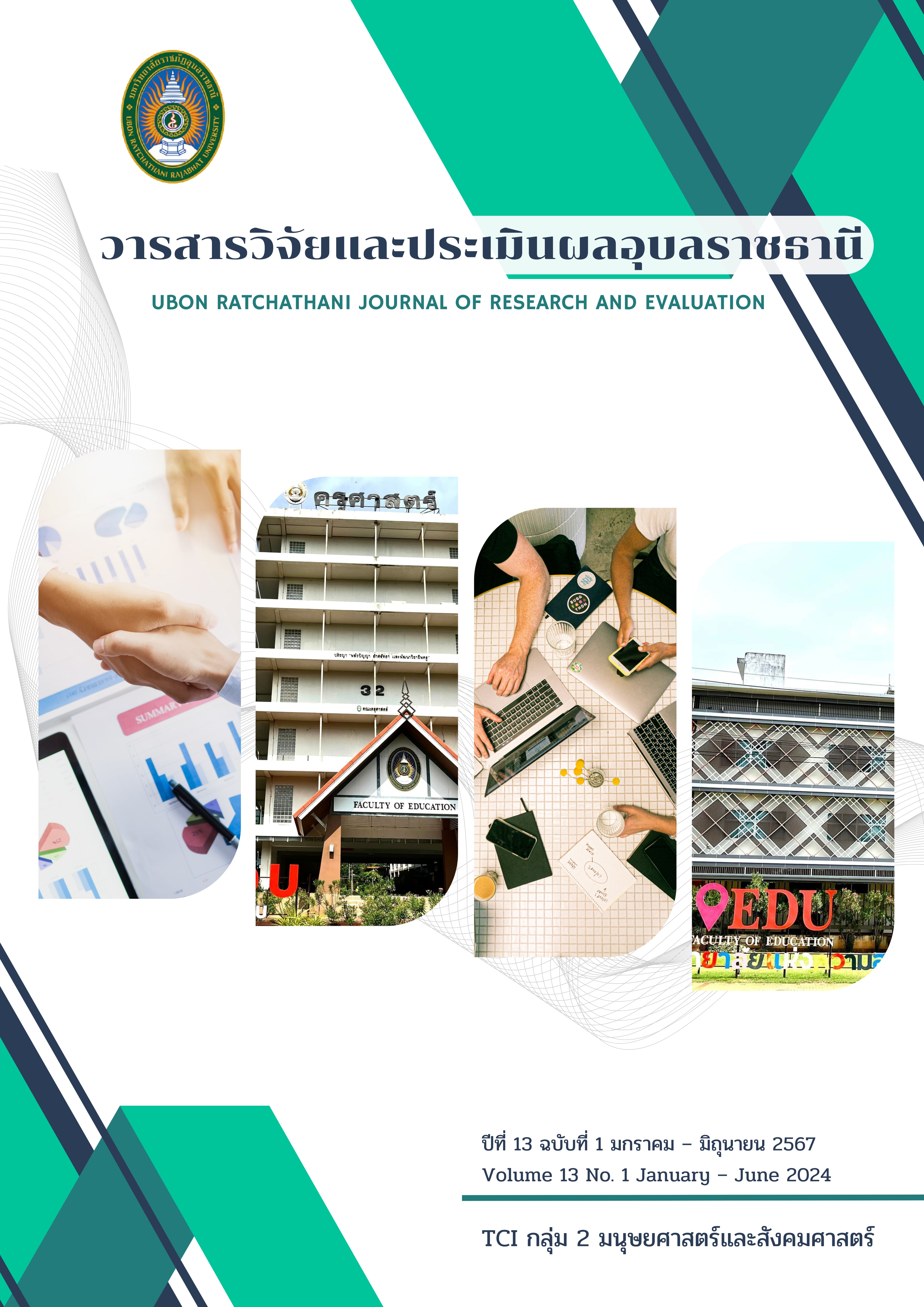การพัฒนาความสามารถในการอ่านสะกดคำไม่ตรงตามมาตราตัวสะกดแม่ กด โดยใช้เกมเป็นฐานสำหรับนักเรียนชั้นประถมศึกษาปีที่ 3
คำสำคัญ:
การอ่านสะกดคำ, แบบวัดผลสัมฤทธิ์การอ่านสะกดคำ, การใช้เกมเป็นฐานบทคัดย่อ
การวิจัยครั้งนี้มีวัตถุประสงค์เพื่อ เปรียบเทียบความสามารถในการอ่านสะกดคำไม่ตรงตามมาตรา แม่ กด ระหว่างก่อนเรียนและหลังเรียนโดยใช้เกมเป็นฐาน ของนักเรียนชั้นประถมศึกษาปีที่ 3 และ ศึกษาความพึงพอใจของนักเรียนชั้นประถมศึกษาปีที่ 3 ที่มีต่อการพัฒนาความสามารถในการอ่านสะกดคำไม่ตรงตามมาตราโดยใช้เกมเป็นฐานของนักเรียนชั้นประถมศึกษาปีที่ 3 ตัวอย่างที่ใช้ในการวิจัย คือ นักเรียนชั้นประถมศึกษาปีที่ 3 โรงเรียนบ้านนาดีดอนจาน จังหวัดยโสธร จำนวน 14 คน ซึ่งได้มาโดยการเลือกสุ่มแบบกลุ่ม เครื่องมือที่ใช้ในการวิจัย ได้แก่ แผนการจัดการเรียนรู้กิจกรรมการอ่านสะกดคำ จำนวน 7 แผน แบบทดสอบวัดผลสัมฤทธิ์การอ่านสะกดคำที่สะกดไม่ตรงตามมาตราแม่ กด เป็นแบบทดสอบปรนัยชนิดเลือกตอบ 4 ตัวเลือก จำนวน 30 ข้อ แบบวัดความพึงพอใจของนักเรียนที่มีต่อการเรียนด้วยแผนการสอนการอ่านสะกดคำที่สะกดไม่ตรงตามมาตราตัวสะกด จำนวน 10 ข้อ เป็นแบบวัดชนิดมาตราส่วนประมาณค่า (Rating Scale) 3 ระดับ สถิติที่ใช้ในการวิเคราะห์ข้อมูล ได้แก่ ค่าเฉลี่ย ส่วนเบี่ยงเบนมาตรฐาน และค่าทดสอบลำดับพิสัยวิลคอกซอล
ผลการวิจัยพบว่า
- ผลการเปรียบเทียบความสามารถในการอ่านสะกดคำไม่ตรงตามมาตราตัวสะกดแม่ กด โดยใช้เกมเป็นฐานสำหรับนักเรียนชั้นประถมศึกษาศึกษาปีที่ 3 มีคะแนนเฉลี่ยเท่ากับ 13.64 คะแนน และ 24.43 คะแนน ตามลำดับ และเมื่อเปรียบเทียบคะแนนก่อนเรียนกับหลังเรียนการจัดการเรียนรู้ พบว่า สูงกว่าอย่างมีนัยสำคัญทางสถิติที่ระดับ .05 ซึ่งสอดคล้องกับสมมุติฐานการวิจัยที่ตั้งไว้
- ผลประเมินระดับความพึงพอใจในการอ่านสะกดคำไม่ตรงตามมาตราตัวสะกดแม่ กด โดยใช้เกมเป็นฐานสำหรับนักเรียนชั้นประถมศึกษาศึกษาปีที่ 3 มีคะแนนเฉลี่ย เท่ากับ 2.87 และมีค่าส่วนเบี่ยงเบนมาตรฐาน เท่ากับ .29 พบว่ามีความพึงพอใจต่อกิจกรรมการเรียนรู้ โดยรวมอยู่ในระดับพึงพอใจมาก
เอกสารอ้างอิง
กระทรวงศึกษาธิการ. (2551). ตัวชี้วัดและสาระการเรียนรู้แกนกลาง กลุ่มสาระการเรียนรู้ภาษาไทยตามหลักสูตรแกนกลางการศึกษาขั้นพื้นฐาน พุทธศักราช 2551. กรุงเทพฯ: โรงพิมพ์ชุมนุม สหกรณ์การเกษตรแห่งประเทศไทยจำกัด.
กฤดาภัทร สีหารี และภวิกา เลาหไพฑูรย์. (2561). มุมมองวิศวกรรมซอฟต์แวร์ต่อการเรียนรู้ด้วยเกมดิจิทัลสำหรับการศึกษาแบบจิ๊กซอว์ สำหรับนักเรียนชั้นมัธยมศึกษาปีที่ 3 (วิทยานิพนธ์ครุศาสตรมหาบัณฑิต, สาขาวิชาวิทยาการคอมพิวเตอร์และสารสนเทศ). มหาวิทยาลัยราชภัฏบุรีรัมย์, บุรีรัมย์.
บรรจง พลไชย. (2556). หลักการใช้ภาษาไทย. วารสารห้องสมุด. 57(1), 35-46.
พิมลพร พงษ์ประเสริฐ. (2563). การพัฒนาความสามารถด้านการอ่านและการเขียนสะกดคำของนักเรียนชั้นประถมศึกษาปีที่ 1 โดยการจัดการเรียนรู้ตามรูปแบบของฮันเตอร์ร่วมกับแบบฝึกทักษะ (วิทยานิพนธ์ศึกษาศาสตรมหาบัณฑิต, สาขาวิชาหลักสูตรและการสอน). มหาวิทยาลัยศิลปากร, กรุงเทพมหานคร.
สำนักงานคณะกรรมการศึกษาขั้นพื้นฐาน กระทรวงศึกษาธิการ. (2564). รายงานผลการทดสอบความสามารถ พื้นฐานของผู้เรียนระดับชาติ (NT) ปีการศึกษา 2564. สืบค้น 25 กรกฎาคม 2565, จาก http://180.180.244.48/NT/ExamWeb/FrLogin.aspx? ReturnUrl=%2fNT%2fExamWeb
อาบีดะฮ์ คงสิเหร่. (2562). ผลการจัดการเรียนรู้โดยใช้โมเดลซิปปาร่วมกับเกมที่มีต่อความสามารถในการอ่านและเขียนสะกดคำภาษาไทยของนักเรียนชั้นประถมศึกษาปีที่ 2 (วิทยานิพนธ์ครุศาสตรมหาบัณฑิต, สาขาวิชา หลักสูตรและการสอน). มหาวิทยาลัยราชภัฏสงขลา, สงขลา.
Ellen Howell (2022). USING GAMIFICATION AND GAME-BASED LEARNING TO INCREASE STUDENT ENGAGEMENT (Master’s Thesis Department, of Arts in Education). California State University, Stanislaus.
Jacob Miceli. (2022). COMPARING GAME-BASED ASSESSMENT TO TRADITIONAL ASSESSMENT ON READING COMPREHENSION (Master’s Thesis Department, of Science Psychology). California State University, Stanislaus.
ดาวน์โหลด
เผยแพร่แล้ว
รูปแบบการอ้างอิง
ฉบับ
ประเภทบทความ
สัญญาอนุญาต
ลิขสิทธิ์ (c) 2024 วิจัยและประเมินผลอุบลราชธานี

อนุญาตภายใต้เงื่อนไข Creative Commons Attribution-NonCommercial-NoDerivatives 4.0 International License.
1. บทความที่ตีพิมพ์ในวารสารนี้ได้มีการตรวจสอบการลอกเลียนงานวรรณกรรมแล้ว ไม่เกินร้อยละ 25
2. บทความที่ตีพิมพ์ในวารสารนี้เป็นข้อคิดเห็น ข้อค้นพบของผู้เขียนบทความ โดยผู้เขียนบทความต้องเป็นผู้รับผิดชอบต่อผลทางกฎหมายใด ๆ ที่อาจเกิดขึ้นจากบทความนั้น ๆ
3. บทความ ข้อมูล เนื้อหา รูปภาพ ฯลฯ ที่ได้รับการตีพิมพ์ในวารสารวิจัยและประเมินผลอุบลราชธานี ถือเป็นลิขสิทธิ์ของวารสารวิจัยและประเมินผลอุบลราชธานี หากบุคคลหรือหน่วยงานใดต้องการนำทั้งหมดไปเผยแพร่ต่อหรือเพื่อกระทำการใดๆ จะต้องได้รับอนุญาตเป็นลายลักษณ์อักษรจากวารสารวิจัยและประเมินผลอุบลราชธานีก่อนเท่านั้น และจะต้องมีการอ้างอิงวารสารวิจัยและประเมินผลอุบลราชธานี ฉบับนั้น ๆ ด้วย






